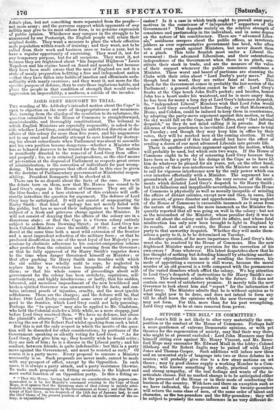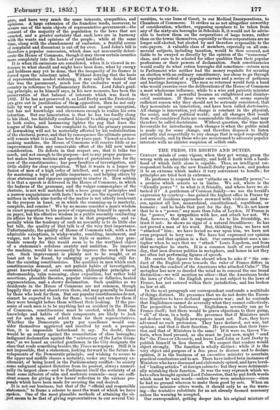SUPPOSE " THE BILL " IN COMMITTEE ?
Loan jollies Bill is not likely to alter very materially the com- position or the conduct of the House of Commons. Perhaps half a score gentlemen of extreme Democratic opinions, or with pet theories for the regeneration of society, may find their way there, who might be at present excluded : Lord John Manners may find
himself sitting over against Mr. He Vincent, and Mr. Beres- ford Hope may encounter Mr. Edward Miall in the lobby ; Colonel Sibthorp and Sir Robert Inglis may be paired off with Lloyd Jones and Thomas Cooper. Such' additions will infuse new ideas and an unwonted style of language into two or three debates in a session ; will probably give rise to a few stray motions on set theses ; may by good chance supply a working Member to a Com- mittee, who knows something by study, practical experience, and. strong sympathy, of the real feelings and wants of the in- articulate classes. But no marked change is to be anticipated either in the personnel of the House or in their mode of conducting the business of the country. With here and there an exception such as we have indicated, the five-pounders and the twenty-pounders will return the same class of men, of the same order of talent and character, as the ten-pounders and the fifty-pounders ; they will be subject to precisely the same influences in no very different de- greet and have very much the same interests, sympathies, and opinions. A large extension of the franchise tends, moreover, to secure one of the main objects of representative government—the consent of the majority of the population to the laws that are enacted, and a greater certainty that such laws are in harmony with the wants and opinions of the people ; while at the same time, along with the abandonment of exclusion, a fruitful source of complaint and discontent is cut off for ever. Lord John's bill is therefore a popular concession, which does not necessarily deteri- orate the House of Commons, though it may throw certain counties more completely into the hands of rural landlords. It is when its omissions are considered, when it is viewed in re- ference to what should and might have been done, what by energy and boldness may yet be done, that the incapacity of its framer is forced upon the reluctant mind. Without denying that the basis of representation needed widening, it may safely be denied that this was- the paramount, much less the exclusive want of our country in reference to Parliamentary Reform. Lord John's guid- ing principle, as he himself says, in his new measure, has been the preservation of that balance of interests which was fixed in 1832. If he has not preserved it, as Lord Derby and the Protection- ists give out in justification of the ias opposition, then he not only fails by way of a most unstatesmanlike and meagre conception, but has not knowledge and cleverness enough to realize his own intention. But our lamentation is that he has too fondly clung to his ideal, too faithfully confined himself to adding equal weights to both scales, and hammering tighter the peg that fixes the tongue of the balance. Our complaint is, that the primary process of lawmaking will not be materially affected by his redistribution of the electoral power, and that by consequence the ultimate process will remain what it is and has been for years past. Viewed as a law- making machine, the House of Commons will receive little or no improvement from any conceivable effect of the bill now under consideration. Its defects in that respect are, that it talks too much, and not enough to the purpose—not to any proper purpose— but makes barren motions and speeches of portentous bore for the ears of the constituencies ; has poor faculties of investigation, and little ability for clear exposition. What it wants is a larger in- fusion of men of a high order of intellect, and a proved capacity for mastering a topic of public importance, and helping others by clear statement and rigorous argument to master it. How seldom it is that a speech is delivered in the House of Commons, in which the badness of the grammar, and the vulgar commonplace of the rhetoric, is not well matched with a loose grasp of principles and a narrow acquaintance with facts ! how few are the reports of Com- mittees in which nine-tenths of the matter is not utterly irrelevant to the purpose in hand, or in which the summing-up is masterly, complete, and concise ! We by no means consider a man's wisdom in exact proportion to his power of expressing himself in speech or on paper, but his effective wisdom in a public assembly conducting its affairs by these two mediums is in that proportion ; and es- pecially when the tendency of such an assembly is to do little else but tair, the quality of that talk is of the very first importance. Unfortunately, the quality of House of Commons talk, with a few admirable exceptions, is wishy-washy, rambling, incoherent, and vulgar, not to be prized either in style or matter. Any prac- ticable remedy for this would seem to be the worthiest object of a statesman's sedulous anxiety and ambition. To improve the machine, would be necessarily to improve the work it turns out. Such improvement is plainly not to be sought, or at least not to be found, by enlarging or 'popularizing still far- ther the existing constituencies. The qualities in men which such constituencies demand, are not patient habits of investigation, great knowledge of social economics, philosophic principles of statesmanship, calm reasoning, clear exposition, but rather bold assertions, plausible theories, popular truisms or fallacies, heated argumentation, and a showy declamation. Such qualities as we desiderate in the House of Commons are not common, though happily they are not absent even there, and may generally be found by those who look for them. But our popular constituencies do not, cannot be expected to look for them ; would not care for them if they were brought before them without their looking. If the pre- sence of such men is to be anything but an accident in the House of Commons, constituencies must be erected, which from the knowledge and habits of their components are likely to look out for such men, and select them for their representatives. Whether the Democratic party par excellence would con- sider themselves aggrieved and insulted by such a proposi- tion, it is impossible beforehand to say. No doubt, there would be an outcry against the resuscitation of close boroughs; indignant declamation against the " aristocracy of the Latin Gram- mar," as we heard an excited gentleman in the City designate the class that reads something besides the Times newspaper. Still it is , not impossible, that a statesman, looking forward to the future de- velopments of the Democratic principle, and wishing to secure to the upper and middle classes a certainty, under any temporary ex- oitement, of being heard in the Parliamentary conflict—to society some safeguard against dictation from its poorest, always numeri- cally its largest class—and to Parliament itself the certainty of at least some infusion of calm and moderate counsels—may see suffi- . tient reason for giving a few hours' reflection to the various pro- posals which have been made for securing the end desired.
It is not our business, but that of the " official and responsible statesmen," to frame a scheme to meet the want of which we have - spoken. One of the most plausible methods of attaining the ob- .Jeot seems to be that of giving representatives to our several Uni-
versities, to our Inns of Court, to our Medical Inoorporations' to Chambers of Commerce. It strikes us as not altogether unworthy of consideration, whether, supposing members to be taken from any of the sixty-six boroughs in Schedule B, it would not be advis- able to bestow them on the corporations of large towns, rather than on the towns themselves, especially as these corperations are no longer self-elected, but elected by and therefore responsible to the rate-payers. A valuable class of members, especially on all com- mercial subjects, including taxation, would be thus secured, not liable to be swayed so directly by the opinion of the "numerous" class, and sure to be selected for other qualities than their popular professions or their powers of declamation. Such constituencies would really do what rotten boroughs did sometimes—return men to Parliament who neither had the money requisite for securing an election with an ordinary constituency, nor chose to go through the repulsive ordeal of a popular canvass and a series of pothouse and hustings harangues. The men so returned would form a band who would exercise over the deliberations of the House of Commons a most wholesome influence, while to a wise and patriotic minister they would lend a powerful because an enlightened and disinter- ested assistance. If these views are correct, it seems seemly sufficient reason why they should not be seriously considered, that they necessitate an innovation, and have been called doctrinaire. All change is innovation, yet change is constant in the physical, the social, and the political world; and all changes that result from well-considered facts are commendable theoretically, and may therefore be called doctrinaire. Without question, the time most
i favourable for introducing such changes is when the public mind is made up for some change, and therefore disposed to listen patiently and respectfully to any change that is urged respectfully and seriously, and by those who are accustomed to advocate popular interests with no sinister suspicion of selfish ends.



























 Previous page
Previous page